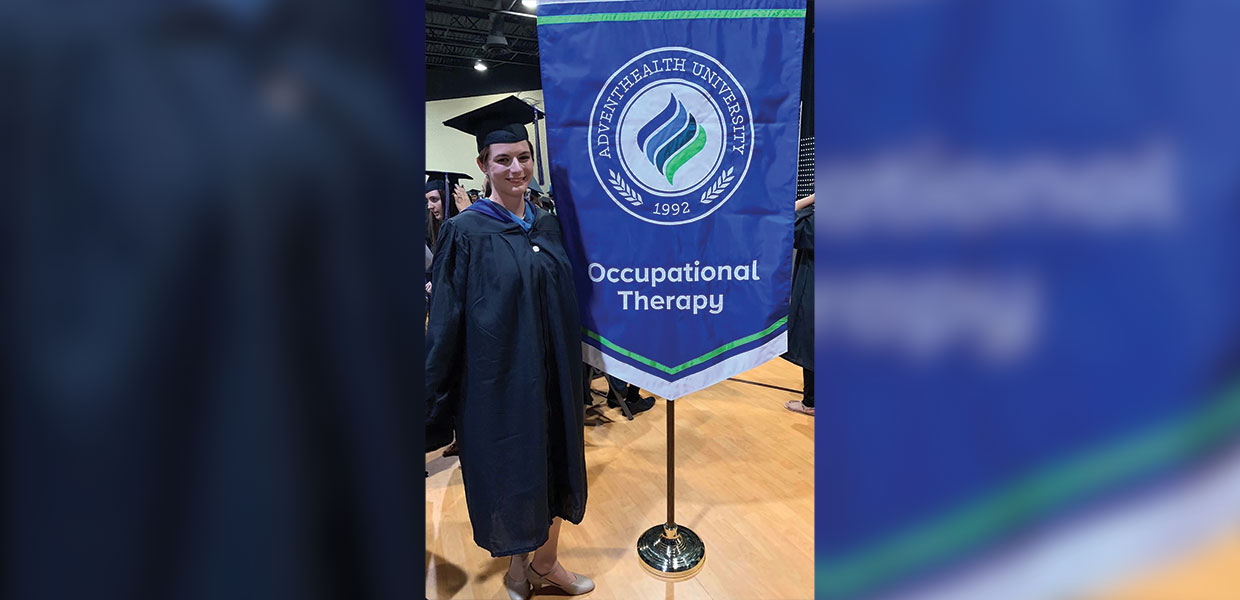
Driven by a vision to teach spiritual healing and whole-person care, AdventHealth University’s (AHU) program curriculums incorporate service-focused, practical learning. Students in the master of occupational therapy (MOT) and occupational therapy assistant (OTA) programs complete this requirement through their Matthew 25 courses, which requires mission-focused clinical work that serves the underrepresented population of the community.
AHU’s MOT program has a permanent partnership with the Wayne Densch Center, a nonprofit housing program in Orlando, Fla. The partnership was established by MOT department chair Tia Hughes, Dr.O.T., in 2017. The Center provides low-income housing for homeless individuals with chronic physical health, mental health, and/or substance abuse issues, for a period ranging from 30 weeks to a maximum stay of two years. Each resident has their own apartment, where they are required to meet standards of living.
Students in AHU OT programs will complete coursework at the Center, but Anna-Kate Reed was selected as an intern at the Center for three months in 2019. “The residents are still asking about her. They’re asking [the Center] to hire her!” said Milly Rodriguez, OTR/L, AHU clinical faculty, and the person who hand-picked Reed for the internship.
One of Reed’s internship objectives was to increase socialization among the residents of the Center. Many of the residents have been homeless for several years, and often have a mental health diagnosis. “A lot of times they felt very isolated and alone,” explained Reed. Reed’s goal was to get them to come out and participate in activities. She organized classes like an introduction to Spanish, since some of the residents mainly spoke Spanish. “I was trying to build more community there,” she said.
She also helped them become more active. She elaborated, “Every day, I led some kind of physical activity: taking walks, playing games like volleyball or kickball. One time we made a human-sized chutes and ladders game.”
Since her internship took place over some of the hottest months in Florida, she also planned indoor activities like board games to get the residents together. She even learned how to play chess from one of the residents. “It was a lot of fun,” she said.
Her efforts paid off. By the end of her internship, she said that “people were coming together and hanging out with each other — people who hadn’t even said hi to each other at the start.”
In addition to her socialization activities, Reed had the opportunity to work with residents for in-home evaluations and life skills education. Students from different MOT cohorts would visit weekly, led by Rodriguez, to provide weekly support.
These opportunities gave Reed a chance to work with residents on an individual basis. The Center’s “fragile housing” population often face physical and mental challenges that make daily life tasks like home maintenance difficult. She and her fellow classmates often assisted residents, who would schedule an appointment in advance, with cleaning their homes.
“One…amazing thing with this whole experience was seeing the importance of listening,” said Reed, “Things they really needed got overlooked or they didn’t feel heard, so just sitting down, listening, and asking ‘what do you need help with?’ could have the biggest impact.”
AHU students are taught to practice whole-person care, and the importance of empathy in a patient’s healing. That, even when under pressure, taking a moment to talk to a person about their mental and emotional state can greatly improve their care. “Being in the therapy field, we can take the time to stop and see how they’re doing to improve their stay and help them heal faster,” commented Reed.
Like many healthcare careers, this role isn’t for everyone. To adjust your way of thinking when communicating with a population that often struggles with behavioral and social challenges, requires a certain personality and ample patience. Reed said, “You have to be open and nonjudgmental. There’s a bit of human nature where sometimes we think we’re better than others, when, really, we’re all the same.”
Reed’s plans now include passing her board exams, and working toward a job at a pediatric extended care facility. She said she would also like to work in home health care, due to her experiences at the Center.
Reflecting on her internship, Reed seemed as positively affected as the residents were by her. “A lot of the residents are amazing. I really enjoyed them … I taught them a couple things,” she said, “but they taught me so much more.”
AdventHealth University | March 2020



Comments are closed.